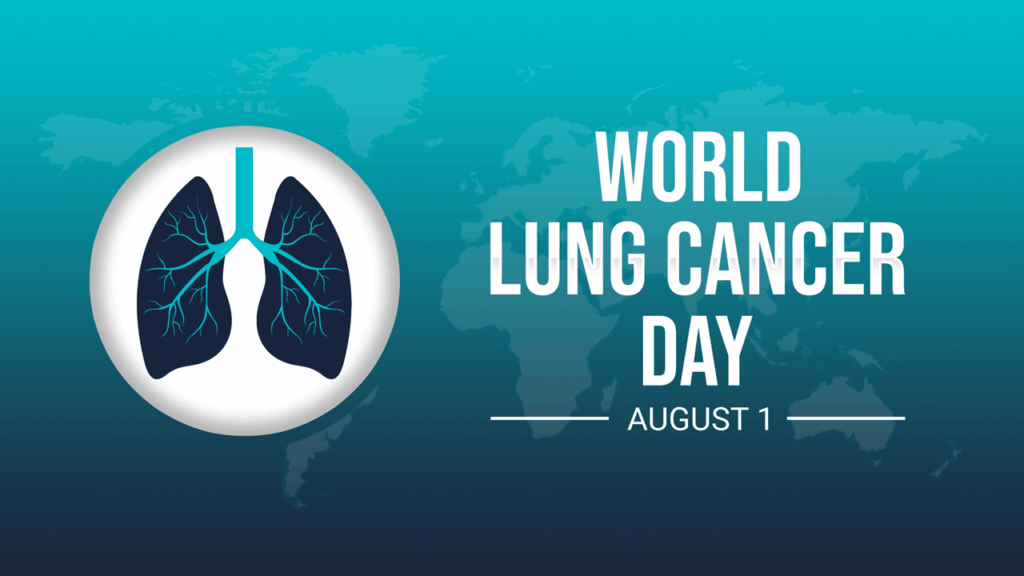Every August 1, World Lung Cancer Day invites us to take a collective breath, highlighting the global burden of lung cancer and fueling hope through awareness, early detection and care. Established in 2012 by the Forum of International Respiratory Societies (FIRS), the day serves as a powerful catalyst to unite patients, caregivers, advocates and researchers in one mission: to reduce lung cancer’s devastating toll and accelerate progress toward cures.
Key Stats and Takeaways About Lung Cancer
Lung cancer remains the deadliest cancer worldwide, with nearly 2.5 million new cases diagnosed annually. While smoking is a well-known risk factor, an alarming 10% to 25% of cases now occur in individuals who have never smoked, highlighting the need to broaden awareness of other risks such as air pollution, second-hand smoke, occupational carcinogens like asbestos and radon, genetics and even certain herbal remedies.
Emerging research links air pollution to TP53 DNA mutations in non-smokers, emphasizing the role of environmental factors in disease onset.
Advances in precision medicine are also reshaping treatment, with notable developments such as the approval of Emrelis (telisotuzumab vedotin) for c-Met positive NSCLC.
Why Broader Awareness Matters
Recent research from the global Sherlock‑Lung study highlights a startling connection between air pollution and lung cancer, even in non-smokers. Tumors in high-pollution regions were more likely to exhibit mutations in the key TP53 gene and evidence of accelerated cellular aging —proof that lung cancer isn’t confined to smokers alone.
This data is mobilizing efforts from lung health groups like FIRS and the American Lung Association, who are calling for expanded access to low-dose CT-based screening for individuals at risk, including those with environmental exposures.
Spotlight on Early Detection for World Lung Cancer Day 2025
Early detection is the game-changer in lung cancer survival. For patients diagnosed at stage I, the five-year survival rate can reach 64%, compared to under 30% in later stages.
That’s why screening matters — and it’s why organizations worldwide are rallying on World Lung Cancer Day 2025.
Social media campaigns like #WorldLungCancerDay, #WLCD2025 and #ScreeningSavesLives flood platforms on August 1, offering educational tools, survivor stories and easy shareables to amplify the life-saving impact of screening. The Lung Cancer Foundation of America is among those leading this charge.
From Diagnosis to Precision Care
Thanks to advances in genomic profiling and precision medicine, patients can now access targeted treatments tailored to specific mutations. A notable example is zipalertinib, a promising new agent targeting EGFR exon 20 mutations, often found in a subset of non-small cell lung cancer (NSCLC) cases. Early-phase trials reported by MSK show encouraging responses, potentially offering new hope for patients with this normally resistant subtype.
Other recent innovations include perioperative use of osimertinib and emerging HER2-targeted tyrosine kinase inhibitors (TKIs) such as zongertinib and sevabertinib, which have shown impressive response rates at ASCO 2025. Antibody-drug conjugates (ADCs) like ifinatamab deruxtecan in Phase III trials for small cell lung cancer (SCLC) are also reshaping the therapeutic landscape.
Immunotherapy continues to evolve. Phase I findings for agents like JNJ‑86974680, an adenosine receptor antagonist used alongside PD‑1 inhibitors, hint at potential breakthroughs for patients who don’t benefit from current checkpoint inhibitors.
The Promise and Progress of New Drugs for Lung Cancer
In the biotech arena, ivonescimab stands out as one of the most closely watched drugs. This bispecific antibody targets PD‑1 and VEGF‑A simultaneously and has already been approved in China. A headline-making Phase III study showed survival trends comparable — or in some cases superior — to Keytruda. AstraZeneca is now aiming to secure US rights in a potential multi-billion-dollar deal with Summit Therapeutics. Summit also recently reported positive Phase III results in China, with data showing nearly a 50% reduction in progression risk versus the comparator treatment — news that ignited a surge in its stock price.
Yet as these breakthroughs unfold, advocates emphasize that access remains critical. Rising trends in non-smoker lung cancer, especially in younger women with genetic mutations like EGFR, mean remaining vigilant and expanding screening criteria are essential. Stories of countless individuals remind us that lung cancer can affect anyone — regardless of age or smoking history.
Stories That Resonate
Individual stories bring urgency and hope.
Brian Gemmell, a UK fitness instructor with no typical symptoms, caught his lung cancer early after noticing finger clubbing. His prompt diagnosis and treatment highlight the power of listening to subtle physical cues — and the importance of advocating for one’s health.
Similarly, support networks like LUNG FORCE Heroes and the Roy Castle Lung Cancer Foundation continue to provide survivors with community, awareness and resilience on this day of global solidarity.
How to Get Involved in World Lung Cancer Day 2025
World Lung Cancer Day is more than awareness — it’s action. Here’s how you can support the mission on August 1:
- Spread the word via #WorldLungCancerDay and #WLCD2025.
- Talk with healthcare providers about whether low‑dose CT screening is right for you or your loved ones.
- Educate yourself on risks, from smoking and pollution to occupational exposures and genetics.
- Support research funding, advocacy groups and patient support initiatives.
- Share stories to destigmatize lung cancer — highlighting cases in non-smokers and survivors who defy expectations.
This World Lung Cancer Day, progress isn’t just measured in statistics or drug approvals — it lives in earlier diagnoses, personalized care and the unity of patients, caregivers, researchers and advocates.
The path to curing lung cancer is illuminated by science, innovation and human resilience. Every fundraiser, shared post, screening discussion and clinical trial enrollment gets us closer to a future where lung cancer no longer casts its dire shadow.











Join or login to leave a comment
JOIN LOGIN